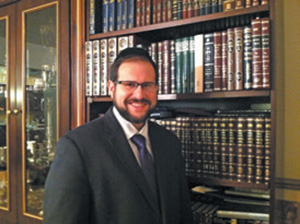
This week, one of the non-Jewish teachers in yeshiva related that he is surprised that there were regular general studies classes during Chanukah. He noted that generally during Jewish holidays there is no school at all and all Jewish businesses are closed. So why would Chanukah be different?
The truth is that it’s not only a non-Jewish teacher who had this question. Many of my students in both schools that I am privileged to be a part of have voiced, many rather vociferously, how bothered they are by the fact that we have classes on Chanukah. Some complain that it dampers the holiday spirit, while others use the religious complaint—how can we have general studies classes on Chanukah? When I ask those students what they would be doing if we didn’t have classes, most smile and admit that they would be “chilling,” but reassure me that it’s only because they need to do so to put themselves in the proper mindset so they can fulfill the mitzvah of lighting properly.
I know of one yeshiva that gave off from general studies classes during Chanukah. It was at the request of the students who fulfilled their pledge to utilize that time to learn Torah! That actually makes some sense!
I must admit that I do understand my students, because I had the same complaint when I was a student. I couldn’t stand having a regular day of school during Chanukah.
However, understanding why we go about our regular lives during Chanukah is fundamental to understanding the essence of this most unique and elevating holiday.
The Beis Yosef asks why Chanukah is an eight-day holiday and not seven days. If they had enough oil to light the menorah for one day, then the miracle was only for seven days!
Rav Moshe Feinstein, zt”l, proposed that we have an extra day on Chanukah to celebrate nature itself. After celebrating for seven days that an insufficient amount of oil could remain burning for seven days beyond its natural capacity, we celebrate the fact that oil burns ever. On Chanukah we remind ourselves that nature is a pseudonym for Hashem, that what we call natural is really supernatural, only we get used to it and fail to appreciate the miracles of nature.
Rabbi Ephraim Wachsman made the following observation: “Imagine if we woke up one morning and all the chickens were laying oranges and eggs were growing on trees. Wouldn’t we all be in wonder and shock at the incredible phenomenon taking place?
“So just because it’s the other way around, should we not be in absolute wonder and shock over the incredible miracle that eggs emerge from chickens, and oranges grow on trees?”
During Shabbos, and all of the major holidays of the year, we are transported into a different reality. We don’t do melacha, we spend the day in the company of family and friends and bask in the embrace of Hashem with special tefillos and mitzvos. It’s not a life that we could uphold in our current reality. It is in fact a portentous glimpse into the utopian world of the future. During those holy days we live an unnatural, superior existence.
On Chanukah, however, life goes on as normal. We head off to work and to school and go about our regular mundane lives. It’s a regular day, but it’s not!
The days of Chanukah elevate our normal routines and create a sense of holiness in our natural lives. We recite Hallel in the morning, recite Al Hanisim in davening and bentching, and, of course, light the menorah. We focus on the things we should be grateful for, the miracles we take for granted every day, which include our natural abilities, our beating heart, our communities, and the freedom to be Torah observant. For eight days and nights we live our regular lives, but on a higher and more spiritually minded plane. And when it’s over, we are hopefully inspired enough to take those emotions and gratitudes with us to light and warm the cold and dark winter.
Chanukah is a weekday holiday in the sense that it elevates the weak-days, strengthening them and us.
Well, maybe not completely natural—my sister complained that at work this week, all day long her sheitel smelled like latkes. I’m not sure why she was complaining—sounds (or smells) good to me!
By Rabbi Dani Staum
Rabbi Dani Staum, LMSW, is the rabbi of Kehillat New Hempstead as well as a rebbe and the guidance counselor at Heichal HaTorah in Teaneck, New Jersey, principal at Mesivta Ohr Naftoli of New Windsor and a division head at Camp Dora Golding. He also presents parenting classes based on the acclaimed Love and Logic methods. His email address is [email protected]. His website is www.stamtorah.info.













